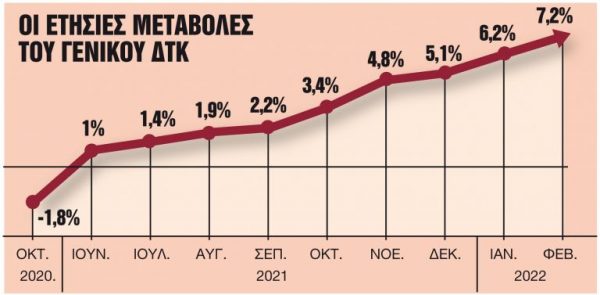
The 25-year record inflation in February heralds bad news about the level it can reach in March and the coming months, putting pressure on households and businesses. March turned out to be the month of price hikes, with businesses trying to cover the unprecedented rise in energy costs with price increases.
Estimates show an increase of more than 8% since last month – without taking into account the effects of war – the increase reached 7.2% and was close to the high records of 1996.
In the economic staff they are already resetting this year’s goals, which will be reflected in the Medium Term in April, with this task being too difficult due to the high uncertainty caused by the unknown outcome of geopolitical turbulence. Revised projections currently raise inflation by more than 4-5%, from initial estimates to 1%.
Analysts estimate that inflation, in 2022, will remain at the level of the first months, at 7%, as price pressures concern not only the energy sector but many other sectors, as well. Nightmarish scenarios even suggest an increase that can reach 11%. If these forecasts are confirmed, then the price rises will return to their highest level since 1994, when inflation surged (10.7%), while, in 1993, it was at 12%.
The impact is not limited to the economic field alone, but has serious consequences on the social and political life, as well. The figures are characteristic: within a year the price of natural gas increased by 78.5%, electricity by 71.4% and heating oil by 41.5%.

Moves of the Greek government
The price surge shrinks incomes and puts pressure on businesses, as well as it fuels political recriminations between government and opposition. The government is trying to find a common European solution that will give the financial staff the budgetary leeway to cover as much cost as possible.
The best of the expected revenues, in the first two months of the year, gave the significant space for the recent package of measures to 1.1 billion. At the moment, the government is refuting the scenarios for a reduction in fuel taxes. The Greek economy could not afford such a move. The 60% of the final consumer price of motor fuels in Greece is due to VAT and excise duty.
Since September, the government has allocated approximately 3.5 billion euros for energy and heating costs to support households and businesses. Most of this amount is fiscally neutral as it is covered by the transition fund. The government, however, has made it clear that it will continue to support the Greek citizens with support measures, but in fear of potential turmoil in the markets, it keeps some measures in reserve.
Latest News

Airbnb Greece – Initial CoS Ruling Deems Tax Circular Unlawful
The case reached the Council of State following annulment applications filed by the Panhellenic Federation of Property Owners (POMIDA)

Mitsotakis Unveils €1 Billion Plan for Housing, Pensioners, Public investments
Greek Prime Minister Kyriakos Mitsotakis has announced a new set of economic support measures, worth 1 billion euros, aiming to provide financial relief to citizens.

Alter Ego Ventures Invests in Pioneering Gaming Company ‘Couch Heroes’
Alter Ego Ventures' participation in the share capital of Couch Heroes marks yet another investment by the Alter Ego Media Group in innovative companies with a focus on technology.

Corruption Still Plagues Greece’s Driving Tests
While traffic accidents continue to claim lives on Greek roads daily, irregularities and under-the-table dealings in the training and testing of new drivers remain disturbingly widespread

Pope Francis Died of Stroke and Heart Failure Vatican Confirms
As news of the official cause of death spread, tributes poured in from across the globe. The 1.4 billion-member Catholic Church is united in grief, remembering a pope who championed inclusion, justice, and compassion

Increase in Both Museum Visits, Revenues for 2024
As expected, the Acropolis was the top archeological site in the country, followed by Sounion, Mycenae, the ancient theater of Epidaurus, and Vergina in northern Greece

Where Greece’s Tourists Come From: A Look at 2025’s Top Visitor Markets
The United Kingdom continues to hold the top spot as the largest source of incoming tourism, with 5.6 million seats booked for Greece this summer — up 2.2% from last year. This accounts for 20% of all international air traffic to Greece

Pope Francis: A Pontiff Who Reshaped the Papacy and Sparked a Global Conversation
His first words from the balcony of St. Peter’s Basilica—“Brothers and sisters, good evening”—set the tone for a pontificate that would challenge norms, favor mercy over dogma, and bring the papacy closer to the people.

When Blue Skies was Unmasked as ND’s Political ‘Slush Fund’
The fact that so many top New Democracy (ND) party cadres were paid by the firm Blue Skies, owned by Thomas Varvitsiotis and Yiannis Olympios, without ever citing this publicly, raises very serious moral issues, regardless of the legality

Greek Women’s Water Polo Team Top in the World after 13-9 Win Over Hungary
The Greek team had previously defeated another tournament favorite, the Netherlands, to reach the final.











![Πλημμύρες: Σημειώθηκαν σε επίπεδα ρεκόρ στην Ευρώπη το 2024 [γράφημα]](https://www.ot.gr/wp-content/uploads/2025/04/FLOOD_HUNGRY-90x90.jpg)




![Ξενοδοχεία: Μεγάλο το ενδιαφέρον για επενδύσεις στην Ελλάδα – Η θέση της Αθήνας [γραφήματα]](https://www.ot.gr/wp-content/uploads/2025/03/Athens-hotels-90x90.jpg)
























 Αριθμός Πιστοποίησης
Αριθμός Πιστοποίησης